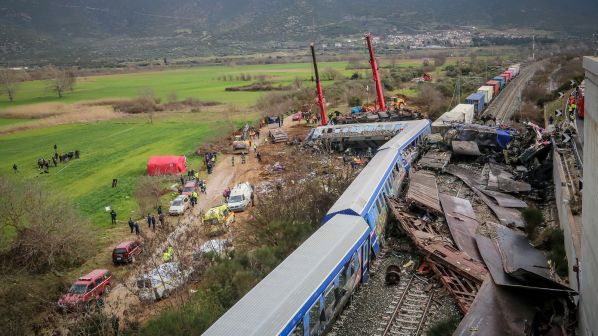THE transport minister of Greece, Mr Kostas Karamanlis, has resigned after a passenger service collided head-on with a freight train near Larissa on February 28, killing at least 43 people.
The accident took place in the Tempi area, shortly after the northbound Athens - Thessaloniki service had left Larissa station just before midnight.
The train was carrying around 350 people, about two-thirds of them believed to be students returning to Thessaloniki after the Greek Orthodox Lent holiday, the BBC reported.
As the train emerged from a tunnel, it collided head-on with a freight train running from Thessaloniki to Larissa. The first four coaches of the passenger train derailed, and fire broke out which “almost completely destroyed” the first two coaches, according to Thessaly regional governor, Mr Kostas Agorastos.
Firefighters have reported that temperatures in the fire exceeded 1300°C, which is making the task of identifying the victims extremely difficult.
Karamanlis said he was resigning as a mark of respect for those who had died, and was taking responsibility for the government's failure to modernise the national railway network in the three and a half years it had been in power.
The direct cause of the accident remains unclear, but Agorastos says the two trains were running on the same track.
Greece’s prime minister, Mr Kyriakos Mitsotakis, has suggested that “tragic human error” was to blame.
The station master based at Larissa and responsible for signalling has been arrested and charged with causing manslaughter and grievous bodily harm by negligence.
He denies wrongdoing and has blamed the accident on a possible technical fault.
Mr Nikos Tsikalakis, the head of the union representing staff at infrastructure manager OSE, told local media that the initial conclusion from the investigation into the accident was that it had been caused by human error.
But he added that a complete picture of the circumstances was not yet known, and pointed to staff shortages on a network with only 750 employees where there should be over 2000.
Long-running problems with the signalling on the Athens - Thessaloniki main line have also been reported. “Nothing works,” says Mr Kostas Genidounias, president of the drivers’ union.
“Everything happens manually,” he added, with neither signals nor electronic traffic control systems functioning correctly.
As the investigation and efforts to recover the bodies of those killed in the crash continued, rail workers across Greece began a day of strike action at 06.00 on March 2.
Public anger over the accident has seen demonstrations taking place in Athens, Thessaloniki and Larissa. The BBC reports that rioters clashed with police outside the head office of OSE in Athens on March 1.

